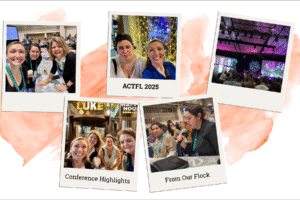
Why Learning a World Language Matters for College and Career
By: Dr. Karyn A. Koven | When students prepare for college, math, science, and English often top the list of priorities. But world language learning is a powerful—and often overlooked—way to strengthen college applications, boost academic performance, and build a foundation for lifelong success.
At LanguageBird, we see firsthand how personalized, one-to-one language study helps students stand out—not just on paper, but in the real world.
Does Studying a World Language Give You an Edge in College Admissions?
Absolutely. Many colleges require at least two consecutive years of world language study, so skipping it in high school can limit a student’s college options.
Language learning also helps students stand out from the crowd. According to a 2018 Pew Research Center study, just 1 in 5 K–12 students in the U.S. take foreign language classes—compared to 92% of European students. Students who pursue language study demonstrate initiative and stand out as global thinkers.
Admissions officers value students who challenge themselves academically. World language learners show commitment, resilience, and curiosity—qualities that top colleges actively seek. Many selective schools recommend three to four years of language study, and applicants who demonstrate fluency or advanced proficiency often gain a competitive edge.
This is especially true for students pursuing international relations, global business, diplomacy, or language-focused honors programs. Long-term dedication to language learning shows both readiness and passion.
What Are the Academic and Brain Benefits of Language Learning?
Studying a second (or third!) language enhances brain development and overall academic performance. Students who consistently learn languages gain:
- Stronger problem-solving and critical thinking skills
- Improved memory, focus, and multitasking abilities
- Greater academic resilience and adaptability
Research from the National Institutes of Health (NIH) shows that bilingual students perform better on executive function tasks—skills that predict academic success and long-term well-being. The NIH explains that “executive function is a major predictor of academic success, and academic success predicts long-term health and well-being.”
Language study also improves literacy in a student’s native language by reinforcing grammar, syntax, and vocabulary—boosting writing skills, reading comprehension, and even standardized test scores.
The American Council on the Teaching of Foreign Languages (ACTFL) reports that students who study a second language tend to outperform peers on academic assessments across subjects.
Real Results: A Parent’s Perspective on the Benefits of a 4th Year of Language
 “I am so thrilled with our decision to enroll my high school student in a LanguageBird Spanish 4 course to complement his heavy courseload. Our teacher was able to work with my son’s unconventional schedule, fitting class time on a weekend evening. He leaves this year with a great understanding of conversational Spanish. Additionally, this fourth year of language made him a highly competitive college applicant, and we see the rewards as his acceptances roll in. Our experience has been excellent from top to bottom!”
“I am so thrilled with our decision to enroll my high school student in a LanguageBird Spanish 4 course to complement his heavy courseload. Our teacher was able to work with my son’s unconventional schedule, fitting class time on a weekend evening. He leaves this year with a great understanding of conversational Spanish. Additionally, this fourth year of language made him a highly competitive college applicant, and we see the rewards as his acceptances roll in. Our experience has been excellent from top to bottom!”
— Crystal R., parent of Ryder, a LanguageBird learner
How Does Language Proficiency Benefit Students Long-Term?
Language learning pays off far beyond high school graduation. Here’s how:
🌍 Study Abroad, Global Academic Programs, & Travel
Students who speak the local language can fully engage in study abroad programs and access more competitive international placements. Language skills enable immersive cultural and academic experiences, helping students connect deeply with local communities.
Beyond academics, language proficiency boosts confidence while traveling, encourages independence, and promotes personal growth. These experiences broaden perspectives and prepare students to thrive in a globalized world.
💼 Career Opportunities in a Global Workforce
Multilingual professionals are in high demand across industries—including business, healthcare, law, education, customer service, and government. A New American Economy report found that demand for bilingual workers in the U.S. more than doubled between 2010 and 2015.
According to the American Immigration Council, employers increasingly seek bilingual candidates in industries that rely on frequent human interaction. These employees often have access to more opportunities and may earn higher salaries.
Forbes also shares that being multilingual “naturally boosts your career prospects and your earning potential, as employers are willing to pay a premium where there is great demand but comparatively little supply.”
🌐 Remote Work & Global Teams
Tie language skills to modern workforce trends like globalization and remote collaboration.
With the rise of remote work and globally distributed teams, the ability to communicate across cultures and time zones has never been more valuable. Language learners often bring global awareness and flexibility that enhance team dynamics, especially in virtual environments.
🗣️ Soft Skills Gained Through Language Learning
Language learning builds more than vocabulary—it cultivates the human skills that matter most in today’s global economy.
Multilingual individuals often excel in:
- Verbal and nonverbal communication
- Active listening and empathy
- Cross-cultural collaboration
- Emotional intelligence
- Adaptability and creative problem-solving
These soft skills are critical in leadership roles, client-facing industries, and collaborative teams—making language learners highly valuable across a wide range of careers.
🤝 Cultural Competency and Global Awareness
Being able to speak another language fosters empathy, adaptability, and cultural understanding—essential skills for navigating diverse college campuses and thriving in global careers.
How Can Students Show Their Language Skills to Colleges?
Colleges want more than just a transcript. Students can show language proficiency through:
- AP® or IB language exam scores – Earn college credit or advanced placement.
- The Global Seal of Biliteracy – A formal credential that demonstrates real-world language fluency.
- College placement exams – High scores allow students to skip entry-level courses and move directly into advanced classes.
Is It Too Late to Start Learning a Language?
Not at all. Even if a student starts in high school, fluency is achievable with the right support. With personalized instruction and consistent practice, learners can prepare for exams, strengthen college applications, and develop practical communication skills.
One-to-one, flexible online programs—like LanguageBird’s—allow students to catch up, accelerate their learning, and succeed on their own timeline.
Language Planning Checklist for College-Bound Students
✅ Research language requirements for target colleges
✅ Aim for 3–4 consecutive years of study
✅ Take AP® or IB exams when available
✅ Pursue credentials like the Global Seal of Biliteracy
✅ Consider online tutoring or immersive summer programs
✅ Maintain language skills, even after meeting basic requirements
Matching Language Learning to Your College & Career Goals
Your goals matter. Here’s how to find the right path:
- For top-tier colleges: Commit to multi-year study and advanced coursework (AP® or IB)
- For global careers or majors: Pair language learning with fields like business, STEM, or social sciencesblo
- For late starters: Choose flexible, accelerated programs that offer personalized support
- For heritage speakers: Formalize your skills with credentials and college placement readiness
How LanguageBird Helps You Succeed
LanguageBird offers live, one-to-one online lessons with native-level instructors in over 15 world languages. We specialize in customized learning experiences to help students:
- Earn academic credit
- Prepare for AP® or IB exams
- Build fluency for travel, college, or careers
- Fit language learning into complex high school schedules
Our approach supports learners of all levels with flexibility, immersion, and personalized goals.
Ready to Start Your Language Journey?
Whether you’re just beginning or aiming to accelerate your progress, LanguageBird is here to help.
👉 Schedule a consultation with our academic advisors to create a personalized plan aligned with your college and career goals.



